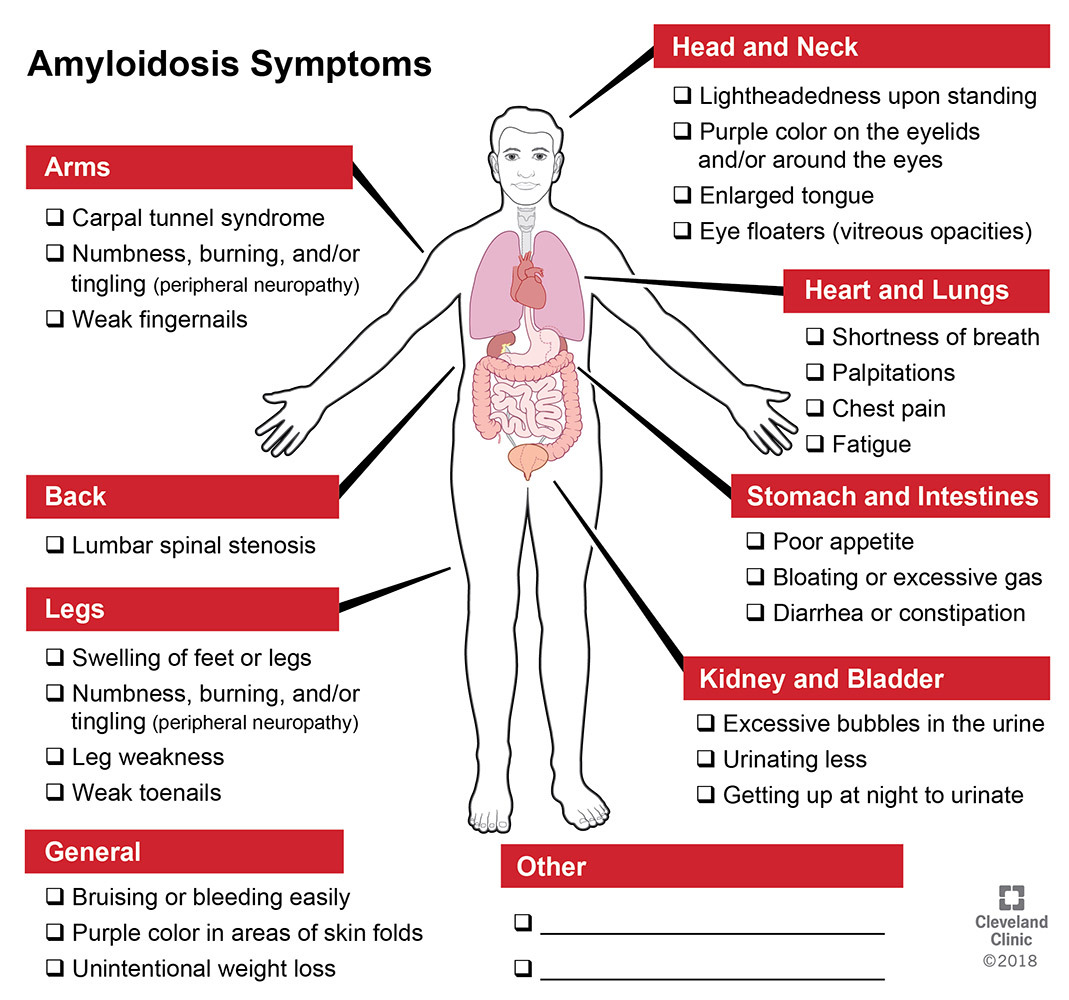What is amyloidosis?
Amyloidosis (am-uh-loy-doh-sis) is a protein disorder. In this disease, proteins change shape (misfold), then stick together and form amyloid fibrils that deposit in your organs. As amyloid fibrils build up, the tissues and organs may not work as well as they should.
Our bodies make several proteins that can cause amyloidosis. To choose the right treatment, it is very important to know the exact protein that is causing the disease.
What are the symptoms of amyloidosis?
Symptoms vary from person to person and depend on which organs are affected. Symptoms may include:

What are the types of amyloidosis?
There are several types of amyloidosis. Two of the most common types are light chain (AL) amyloidosis and transthyretin (ATTR) amyloidosis.
AL Amyloidosis
- Light chains are pieces of antibodies made by white blood cells, specifically plasma cells, in the bone marrow. In AL amyloidosis, a group of plasma cells make too many light chains, which misfold and stick together to form amyloid fibrils. The fibrils are then deposited in organs.
- The most common organs affected are the heart and kidneys. Light chain amyloidosis can also affect the stomach, large intestine, liver, nerves and skin.
Treatment
Treatments for patients with AL amyloidosis include various medications. Most patients take one or two chemotherapy drugs plus steroid medication. The medications work together to destroy the plasma cells that make the light chain proteins. A doctor who specializes in blood disorders (hematologist) will create a treatment plan for you.
ATTR Amyloidosis
- Transthyretin (trans-thy-re-tin), also called TTR, is a protein made by the liver that helps carry thyroid hormone and vitamin A in the blood. Normally, TTR is made up of four identical parts. However, in ATTR amyloidosis, the protein becomes unstable, breaks apart, and deposits in the heart, nerves, and/or ligaments.
- There are two types of ATTR amyloidosis: hereditary (familial) and wild-type. The hereditary type can be passed from one generation to the next. The wild type cannot be passed on to family members.
Treatment
- There are currently two medications approved by the Food and Drug Administration (FDA) to treat patients with hereditary ATTR amyloidosis who have neuropathy.
- There is one FDA-approved medication for patients with wild type or hereditary ATTR who have heart disease.
- Other treatments are being studied, including medications that focus on the cause of ATTR amyloidosis. Your healthcare provider can give you more information.
- Supplements, like green tea extract and turmeric, may help patients with ATTR amyloidosis, but there is very limited evidence to support this type of treatment.
How is amyloidosis diagnosed?
Many tests can help diagnose amyloidosis. A biopsy (the removal of a small piece of tissue) of the affected organ(s) is the most useful test. A pathologist will examine the tissue under a microscope and perform special tests to identify the exact protein that is causing the amyloidosis. Various blood and lab tests along with imaging tests are used to determine the type of amyloidosis and which organs may be affected.
How does amyloidosis affect my life?
Amyloidosis is a long-term (chronic) disease that can be controlled. Early diagnosis and treatment are the keys to managing the disease before it becomes advanced.